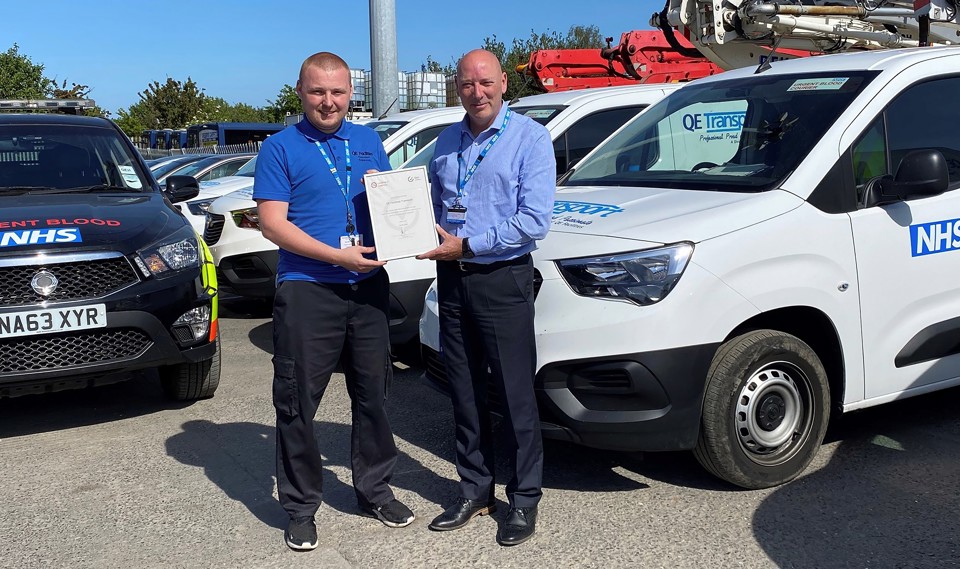The coronavirus pandemic and lockdown have created immense challenges for fleets. New working practices on social distancing and sanitisation, furloughed staff and erratic demand for services gave decision-makers plenty to occupy their days. Many accepted extended working hours as they supported drivers outside of the usual 9-5.
It wouldn’t, then, seem the ideal time to sign up to a quality and standards excellence scheme which required a series of audits to thoroughly examine fleet policies and procedures. Yet that was exactly what Paul Bowmaker and his team did.
Gateshead Health NHS Foundation Trust prides itself on offering a high-quality standard of patient care, not just within its hospitals, but also across its non-clinical services.
In 2014, it set up QE Facilities Ltd (QEF), a wholly-owned subsidiary, to provide many of those services. The goal was to both save the trust money and to prevent services from being privatised, which was happening elsewhere.
“With QEF, we found we could be competitive in the commercial market with the same terms and conditions, but the profits would go back into the NHS – it was win-win for staff and the NHS,” says Bowmaker.
Its success led, a year later, to the formation of QE Transport Services (QET). Bringing the fleet in-house tightened management control and resolved issues over a lack of transparency on budgets, costs and quality of service with the trust’s then incumbent third-party partner.
“We started with four vehicles to move samples, then went to a full courier service. Now we have 80 vehicles and 130 staff,” Bowmaker says.
Gateshead Trust vehicles include cars (some electric), 4x4s, small and large vans and minibuses with services ranging from collecting blood-related products from more than 1,000 locations in the north-east and bluelight services to patient transport cover.
Van Excellence programme
Although Gateshead is the largest fleet managed by QET – it also oversees 40 vehicles for the Coventry and Warwickshire trusts – it was a sufficiently manageable size, with 30 vans, to embark on the Logistics UK (formerly Freight Transport Association) Van Excellence programme.
Coronavirus, though highly disruptive to the business, was not going to halt the process, according to Bowmaker.
“We were affected by coronavirus; we had to change very rapidly due to restrictions within the hospitals,” he says. “Our first priority was to protect our staff and make sure we could continue our services.”
Anyone over the age of 70 was shielded, social distancing was implemented at depots and hospitals, and staff meetings were carried out virtually. Personal protective equipment (PPE), including masks, gloves and hand gels, was distributed to all drivers. Vehicles were wiped down before and after use, following Government guidelines and advice from the hospital prevention control team on decontamination.
Despite operating in a high-risk environment, out of 130 drivers, just six contracted coronavirus (all have recovered and returned to work), while a further two had to self-isolate. The low numbers were thanks to a combination of “good procedures – and a bit of luck”, Bowmaker says.
“We also had the commitment from our staff. We instilled the nature of our job – we’re there for the benefit of the patient and the service to the NHS,” he adds. “They all stood up to the mark.”
Meanwhile, extra support came from local organisations, including hire companies which offered vehicles free of charge and volunteer drivers. They shouldered some of the added workload and played an invaluable role as demand for QET’s services soared.
“We had to do so much more, such as move equipment and staff between labs and collect Covid-19 samples for testing,” says Bowmaker.
“Without their help, our service would’ve been severely affected, and patient health might’ve suffered.”

So, why Van Excellence and why now?
“We looked at the fact we are a commercial entity and we wanted to prove, and make sure, we were up to the standard,” Bowmaker says. “We are spending public money running this business, so we have to be doing things correctly.”
QET has already achieved the ISO 9001 quality management and 14001 environmental standards but wanted its vans to be similarly accredited.
The organisation doesn’t operate trucks, so Van Excellence was an ideal fit. Work started in February, but was then put on hold as coronavirus started to take a grip.
However, QET stayed in touch with the Van Excellence audit team and was offered the option of becoming the programme’s first virtual audit.
“As we got back to normal – well, a new normal – we started progressing this again because we have to keep looking at ways to move forward,” Bowmaker says. “The virtual audits were ideal for us.”
His team was given clear criteria to meet and the process was “one of the smoothest audits I’ve been through”, Bowmaker adds.
“We are audited a lot, both internally and externally, where someone comes into the office, but this was a lot more controlled and more efficient. We gave them the information via screen share, and it went very well.”
Aside from some minor gaps, QET’s processes were watertight, helped by the rigorous NHS legislation it already adheres to, such as quarterly licence checks and full maintenance schedules. Many of the boxes could be immediately ticked.
“In their words, we passed with flying colours and it gave us the extra assurance from an outside organisation,” says Bowmaker. “I would recommend any organisation to look at the Van Excellence programme.”
Three benefits for QET
He points to three particular benefits for QE Transport Services: reassurance to drivers that their vehicles are well maintained and that any concerns would be speedily dealt with to maintain business reputation; gives the trust confidence that QET is spending public money wisely in running and looking after the fleet; and helps with recruitment by showing QET looks after staff and is aware of everything that is happening in the transport world as an outwardly-looking organisation.
This desire to be a good employer results in exceptional levels of staff engagement: turnover is less than 2% and sickness levels are below 1.6%.
Combined with the two ISO standards, Van Excellence gives assurance to the trust, its staff and patients, and to the wider public about the quality of its management, its commitment to the environment and its vehicles and drivers.
The Coventry and Warwickshire Trust fleets, which mirror the Gateshead processes, are also likely to go through the audit process in due course.
Bowmaker has brought his knowledge from working in haulage and transport to the three trust fleets. They mirror the way logistics fleets are run, including providing a fixed amount of time every morning for drivers to complete fully documented vehicle checks, full maintenance schedules and set procedures to be following if there is any issue raised before vehicles are allowed back on the road. Drivers’ hours incorporate plenty of rest periods, with double-crewing where necessary.
As a former driving instructor, he takes safety behind the wheel very seriously. QET has an enviably record: no major accidents, a handful of minor low speed rear-end shunts and a low own-fault incident rate are the mark of a fleet that has excellent buy-in from its drivers.
QET has a dedicated driver trainer who carries out assessments and virtual training to identify any areas for improvement. Any incidents result in an on-the-road appraisal. The organisation also employs a mentoring scheme for new staff.
During the recruitment process, any candidates who are likely to be offered a job are invited back to the business for a driving assessment. Upon completion, Bowmaker receives a report and, when the employee begins work, they are put with an experienced member of staff to undertake three days of mandatory training.
“The training includes how to collect and deliver blood samples, temperature monitor-ing, etc. but also driving performance, and they have to be with the mentor for a number of days until they are signed off as competent and proficient,” he says. “Then they can do the job by themselves.”
Former military and police
Engagement comes from the top and cascades through the management team. QET also employs a lot of former military and police officers so standards are already pretty high.
A handy by-product of the driver training programme is efficiency, and this is measured through telematics. A league table ranks the best and worst which means individual improvements tend to be self-governed.
“If someone is at the bottom one week, they won’t be the next,” says Bowmaker. “We share the results, not as a stick, but because drivers want to see how they are performing. Any stick comes from peer pressure within the team, which is close-knit.”
Since introducing telematics and the league table, fuel efficiency has improved by 10-15% across the team, while maintenance costs have fallen. Today, it is “very rare” to see a driver in the red on the traffic light appraisal system.
While QET is squeezing every last drop from its diesel fleet, it has aspirations to replace them with electric vehicles. Gateshead Trust already has some Nissan Leaf pool cars and Mitsubishi Outlander plug-in-hybrids on the fleet; the petrol engine in the latter is important in the 4x4s, which are deployed as business contingency vehicles.
It is now identifying suitable routes to begin trialling electric vehicles. Bowmaker estimates the next incarnation of the fleet could be a 60/40 split, with 40% being electric. Some of its vehicles cover a large geographic area and the technology isn’t quite there for a wholesale change. But it’s coming.
“Electric is not an option; it’s a must,” he says. “From now, as vehicles come off fleet, we will look to replace them with electric.”
From haulage to hospitals
Paul Bowmaker started his fleet career in haulage and transport for consumer goods companies. He went self-employed as a driving instructor before joining the NHS 18 years ago in pathology, overseeing logistics and procurement until the formation of QET.
Initially transport manager, he was appointed head of transport services in November 2018 and oversees a team of contract managers and an operations manager.
QET services include patient transport, discharge of patients, collection of blood specimens, bluelight services, movement of medical equipment, delivery of medical records and postal services.
Bowmaker on ... funding vehicles
QE Transport Services (QET) puts the bias during procurement tenders on quality, not price. The 60/40 emphasis ensures it gets the best quality vehicles with the best service from the chosen funder.
Anything else, says Paul Bowmaker, is a “false economy”.
He adds: “We have an open book approach and we find that prices are generally similar, so the differentiating factor is the quality of customer service. We can’t be without a vehicle, so we look at the level of support to get a replacement at short notice and get ours fixed at short notice. Customer service is at the forefront.”
Days Fleet is the current funding partner, but QET also has vehicles with Daimler Fleet Management and has previously used Enterprise and Northgate.
“The type of vehicle is secondary. We look at performance and the best technology for what we do, but we also look at awards like International Van of the Year,” says Bowmaker.
“Total cost of ownership doesn’t come into it. We look at the specification, including solid bulkhead and no rear windows, so they have to be secure and efficient. But we take a lower specification because we do a lot of stop/start work.”
He adds: “It’s important for us to control the fleet, so everything is kept in-house except maintenance on the leasing contract.”




















Login to comment
Comments
No comments have been made yet.